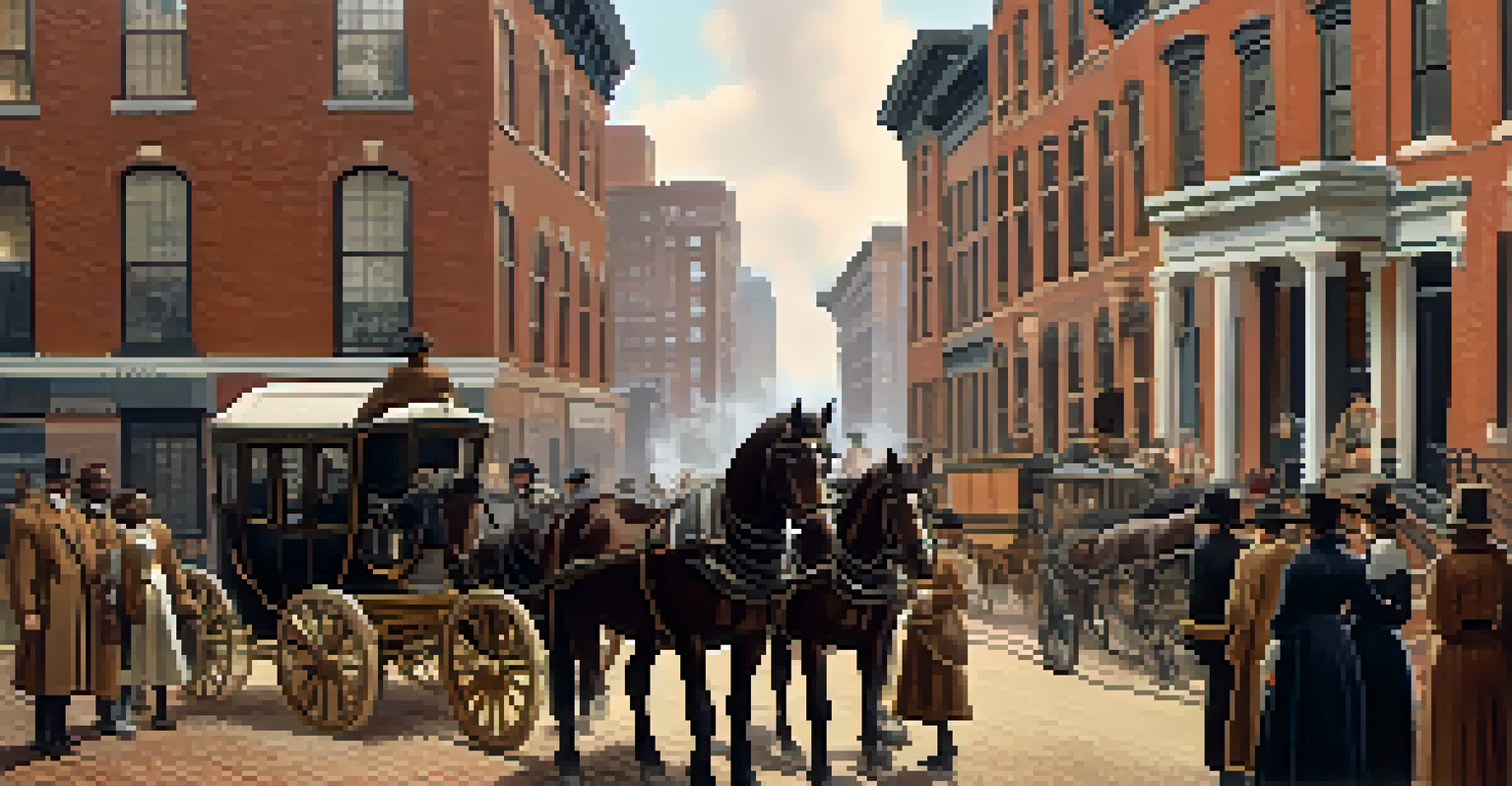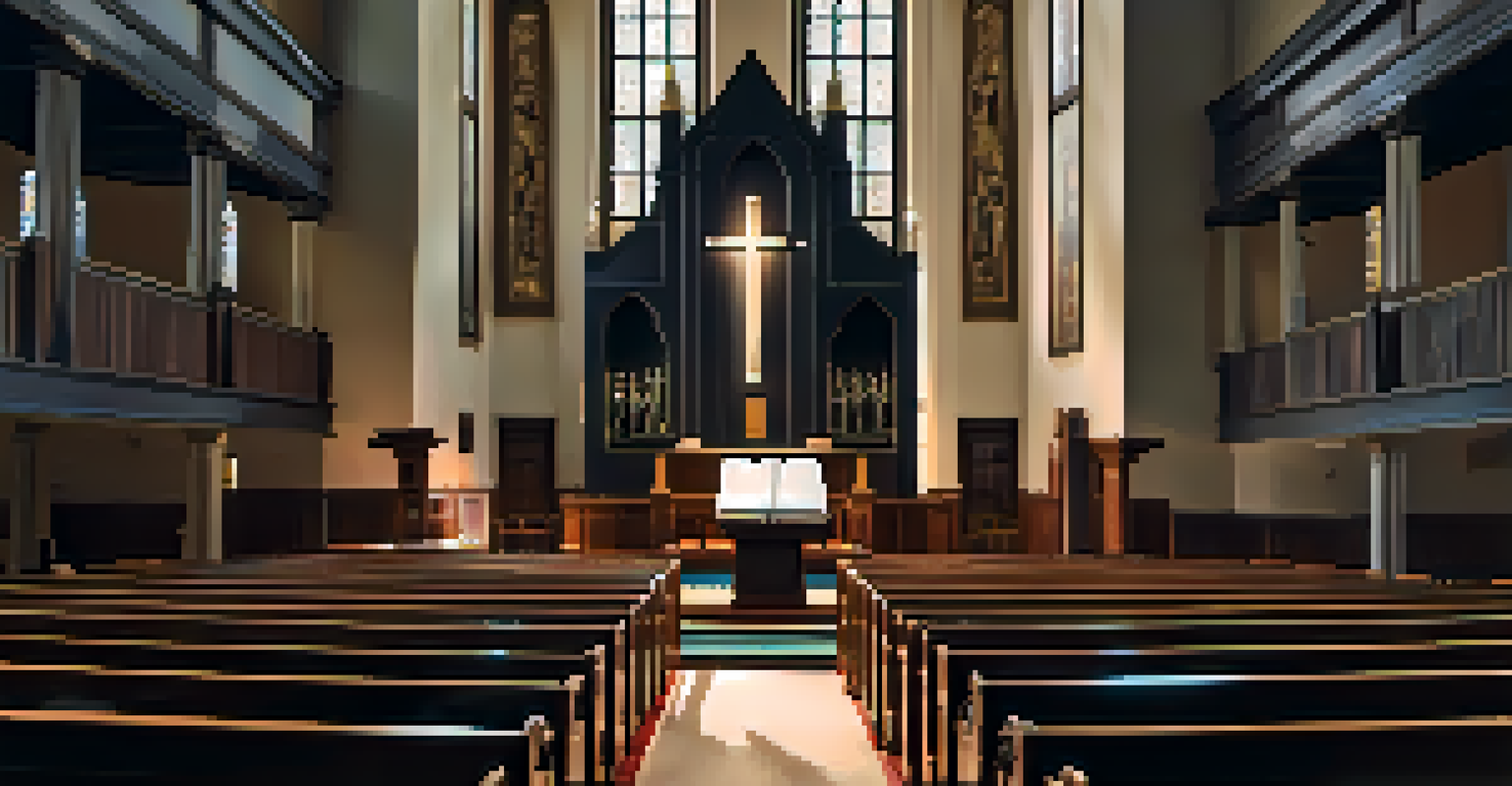The Impact of Boston's Black Community on Abolition

Historical Context of Boston's Black Community
Boston has a rich history that intertwines with the narrative of slavery and abolition. The city was a significant hub for the abolitionist movement, particularly in the 19th century. It was home to a thriving Black community that played a crucial role in challenging the status quo and advocating for freedom.
If there is no struggle, there is no progress.
The Black population in Boston, though small compared to other cities, was influential and deeply engaged in civil rights. Many members of this community were descendants of freed slaves who settled in the area, bringing with them a strong sense of resilience and a desire for justice. Their experiences shaped their commitment to the abolitionist cause.
This historical backdrop sets the stage for understanding how Boston's Black community contributed to the fight against slavery. By examining their efforts, we can better appreciate the collaborative spirit that emerged between Black and white abolitionists during this critical period.
Prominent Figures in Boston's Abolition Movement
Among the most notable figures in this movement was Frederick Douglass, a former slave who became a powerful orator and writer. His speeches in Boston challenged the morality of slavery and inspired many to take action. Douglass's connections with local abolitionists helped to amplify the voices of those who sought to end slavery.

Another key individual was William Cooper Nell, a Black abolitionist and journalist who documented the contributions of Black people in the abolition movement. Nell's advocacy highlighted the importance of Black agency in the fight for freedom, emphasizing that abolition was not solely a white-led initiative.
Boston's Black Community and Abolition
Boston's Black community played a crucial role in the abolition movement, advocating for freedom and civil rights despite their smaller population.
These figures, along with many others, helped to create a network of activists dedicated to the cause. Their collective efforts were instrumental in mobilizing support for abolition across Boston and beyond.
The Role of Black Churches in Abolition
Black churches in Boston served as sanctuaries for those seeking freedom and played a vital role in the abolitionist movement. These institutions provided a space for community organizing, education, and spiritual support, helping to unite individuals around a common cause. They were often the starting points for abolitionist meetings and rallies.
The time for justice has come. The time for slavery to end is now.
Leaders within these churches, such as Rev. Thomas Paul and Rev. Lewis Hayden, emerged as vocal advocates for abolition. They utilized their platforms to raise awareness about the injustices of slavery and to mobilize their congregations for action. Their sermons often included calls to resist oppression and strive for equality.
The impact of these churches extended beyond their immediate communities, as they forged connections with white abolitionists and other organizations. Together, they worked to promote anti-slavery sentiments and push for legislative changes, demonstrating the power of faith in the fight for justice.
Community Organizing and Advocacy Efforts
Boston's Black community engaged in various forms of activism to advocate for abolition. They organized petitions, held public meetings, and created awareness campaigns aimed at educating the broader public on the harsh realities of slavery. This grassroots organizing was crucial for building momentum in the abolitionist movement.
One notable example was the involvement of Black Bostonians in the formation of the New England Anti-Slavery Society. This organization brought together both Black and white activists who were committed to fighting against slavery. Their collaborative efforts were essential in creating a unified front against the institution of slavery.
Cultural Impact on Abolition
Art, literature, and music from Boston's Black community served as powerful tools for advocacy, humanizing the struggle against slavery.
Through these efforts, the Black community demonstrated their determination to effect change. Their advocacy not only contributed to the abolition movement but also laid the groundwork for future civil rights initiatives.
The Fugitive Slave Law and Local Resistance
The passage of the Fugitive Slave Law in 1850 heightened tensions between pro-slavery forces and abolitionists in Boston. This law mandated that escaped slaves be returned to their owners, even if they reached free states. The Black community, along with their white allies, vehemently opposed this legislation.
Activists like Anthony Burns, who was captured under this law, became symbols of resistance. The dramatic trial and subsequent rescue efforts galvanized the community, leading to protests and demonstrations against the law. This incident underscored the lengths to which Boston's Black community was willing to go to defend their rights and the rights of others.
Through acts of defiance and solidarity, the community showcased their resilience in the face of oppression. Their actions not only challenged the law but also inspired others to join the abolitionist cause.
Cultural Contributions to the Abolition Movement
Art and literature played a significant role in the abolitionist movement, and Boston's Black community was at the forefront of these cultural contributions. Writers, poets, and musicians used their talents to convey the horrors of slavery and inspire action. Their creative expressions became powerful tools for advocacy.
For instance, the writings of Black abolitionists like Frederick Douglass and Harriet Jacobs not only documented the realities of slavery but also stirred public sentiment against it. Their narratives provided firsthand accounts that humanized the struggle for freedom, making it harder for the public to ignore the plight of enslaved individuals.
Legacy of Activism in Boston
The efforts of Boston's Black abolitionists laid the groundwork for future civil rights movements, inspiring ongoing advocacy for justice and equality.
Additionally, musical performances, including spirituals and abolitionist songs, served as rallying cries for the movement. These cultural expressions fostered a sense of unity and purpose, fueling the passion of those who fought for abolition.
Legacy of Boston's Black Abolitionists
The legacy of Boston's Black community in the abolition movement is profound and lasting. Their contributions not only helped to dismantle the institution of slavery but also laid the groundwork for future civil rights efforts. The courage and determination displayed during this period continue to inspire activists today.
Many of the principles championed by these abolitionists, such as equality and justice, resonate in contemporary social movements. The fight for civil rights, voting rights, and social justice draws heavily on the foundations established by these early activists.

Moreover, the stories of Boston's Black abolitionists serve as a reminder of the importance of community engagement and activism. Their legacy encourages us to reflect on our roles in advocating for justice and equality in our own time.